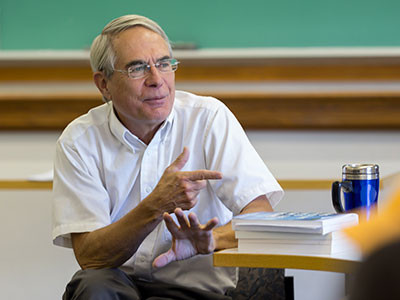The “Inside the PTS Curriculum” series gives you an inside look at what students are learning in their courses at Pittsburgh Theological Seminary. Each article focuses on one class, its subject matter, what students can expect to learn, the required texts, and the kinds of assignments students can expect. We’ll let you know whether the course is required or available for the Master of Divinity (MDiv), the Master of Arts in Pastoral Studies (MAPS), or Master of Theological Studies (MTS). Each article will include the professors’ bio.
This week’s course is: “Ethics and Society.”
About Ethics and Society
During this term, Pittsburgh Theological Seminary students will be identifying and exploring ethical issues with the Rev. Dr. Ron Cole-Turner in the class “Ethics and Society.” This course is required for students in the Master of Divinity (MDiv) degree, fulfils a requirement for the Master of Arts in Pastoral Studies (MAPS) degree, and is open to students in the Master of Theology (MTS) degree program.
This course equips students to reflect on the church and its relationship to its various locations, with a particular focus on national and global contexts and issues. Students will learn to use biblical and theological resources with insight from the social sciences to analyze contexts and to identify and explore ethical issues related to cultural, economic, and social structures in which the church participates in God’s mission.
CS310 builds upon other courses in Bible, church history, theology, field education, and in particular contextual analysis. The specific focus for CS310 is the integration and interaction of all these sources of theological insight (biblical, traditional, and contextual analysis) with today’s contextual realities (social, economic, racial, and political), especially those that define the national and global level. These questions will be explored: What do we mean by ‘Christian’ ethics, and what are the philosophical and theological approaches to ethical reasoning that continue to be influential in grappling with national and global issues today? How do today’s contextual realities shape the church and its theology in the past and today? How does the church seek to be faithful to God’s mission of reconciliation and renewal in local communities and in the wider regional or national context? How do leaders in Christian communities promote Christian ethical discernment and action in addressing social contexts?
Students will complete papers and research projects. Required reading includes Biblical Ethics and Social Change, by Stephen Mott; Exclusion and Embrace: A Theological Exploration of Identity, Otherness, and Reconciliation, by Miroslav Volf; Christ and Culture, by H. Richard Niebuhr; and The Minister as Moral Theologian, by Sondra Wheeler.
About the Instructor
The Rev. Dr. Ron Cole-Turner is the H. Parker Sharp Professor of Theology and Ethics, a position relating theology and ethics to developments in science and technology. Dr. Cole-Turner received a B.A. from Wheaton College and both an M.Div. and Ph.D. from Princeton Theological Seminary. He is an ordained minister of the United Church of Christ, a founding member of the International Society for Science and Religion (currently serving as vice president), and he has served on the advisory board of the John Templeton Foundation and the Metanexus Institute. He has written and edited many books about the intersection of science and theology, and he is the author of the popular baptism hymn, “Child of Blessing, Child of Promise.”

